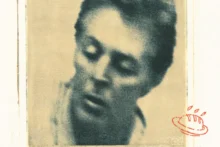History repeats itself, according to Karl Marx, “the first time as tragedy, the second time as farce.” He was writing about Napoleon III of France, the incompetent nepo-nephew of the earlier Emperor Bonaparte. He could just have easily been predicting the 2025 comeback of Oasis. The reunion of the Gallaghers might be a more accurate description given it’s rumoured to be Noel’s Dynamic Pricing Birds with Liam tambourining at centre-stage. Best frontman ever, is he? Also playing shows in the UK next year will be The Jesus Lizard.
Oasis are one of the bands, naturally, who had to crop up – shameless plug alert! – in my new book, Off The Ground: Paul McCartney In The 1990s. In its pages I could not resist the temptation to once again quote Luke Haines’ deliciously accurate description of Noel Gallagher as “Britain’s least psychedelic man.” Alongside that, there is some much ruder material lifted from the entertainingly acerbic writings of the much-missed Neil Kulkarni. His work really does need to be read and addressed by those on the internet who, as I type this, are tearing out their Weller hair to defend Oasis from the haterz using arguments based on popularity, class roots and how funny it was when Liam confused a cocktail for a pizza.
Margarita generosity aside, McCartney was wise to keep Britpop at arm’s length. Even if he sometimes acted diplomatically, there is enough evidence to suggest he, like countless others, found Oasis to be boorish, regressive and derivative.
The 90s was also a decade when Macca reasserted his own psychedelic credentials. Barry Miles’ official biography, Many Years From Now, was published with plenty of verifiable evidence to show that Paul was not the safe and saccharine Beatle but, in fact, the most experimental and open-minded creative radical in the group. More realistically, he was both these things at the same time (and so much more besides). There is no contradiction there. From 1993, he also returned to making out-there and abstract music again, with the help of Martin “Youth” Glover, as The Fireman.
McCartney never fried his brain with acid as regularly or permanently as certain contemporaries of his, which might help to explain his longevity and undiminishing work ethic. He did like to smoke cannabis on the regular which he gave up in 2015, reportedly. Judging from the anecdotes in Miles’ book, McCartney also drank an awful lot of tea. It includes at least 33 pages that mention the hot drink. At one point, McCartney recalls being mocked by William Burroughs’ adventurous associates, Ian Sommerville and Alan Watson, for being a total “tea-head”.
Apologies if this discussion has felt a bit mainstream for those seeking some far-out sounds. With that in mind, here we go. Get your LSD hit, pot to smoke or pot of tea at the ready and dig in.
Weak SignalFine12XU
As Weak Signal member Mike Bones recently posted on Elon Musk’s declining X platform: “U gotta resist the impulse to write clever songs, cuz inevitably you’ll be left with songs that are just clever and nothing else, no blood, no guts, no love”. Bones added later: “Tweets like this are mostly clarifying notes to self, I couldn’t give a fuck what any of u nerds do with your songs.” Whatever rules Bones applies to the output of his own band (with Sasha Vine and Tran Huynh) they seem to be working a charm. Although they can sound ramshackle and deceptively simple, Weak Signal’s songs are far cleverer than Bones likes to admit and the trio make it look much easier than it actually is. Once again, the melodies drift catchily over a fusty, lo-fi chug with Bones’ deadpan baritone contrasting coolly with the other members’ harmonies. As for the consistently engaging lyrics, ‘Wannabe’ finds contentment in life’s small pleasures. The following number might be doing the same thing, possibly ironically, with regard to loneliness and deterioration (“Yeah, yeah, yeah / I’m disappearing…”). With similar ambiguity, ‘Rich Junkie’ fantasises about a life of bling by riffing on a line from the rapper Future. There are philosophical threads running through the whole album, regarding life and how to live it. Not that it’s a self-help audio book, mind. It’s subtler than that. Cleverer. And perhaps less serious. With lots of blood, guts and love on offer.
KandodotheendisinpsychRooster
Kandodo started out as the solo moniker of Simon Price from The Heads. It expanded to a group with additional musicians in the 2010s and now looks like it’s receded back to a one-man-band, for the time being at least. Recorded using a variety of instruments in a home studio at Price’s new base in Northumbria, theendisinpsych partly channels his ongoing obsession with David Bowie, although you wouldn’t immediately glean that without the liner notes. Another influence is Price’s upbringing in Zambia and Malawi. In homage to the Malawian word for cannabis, ‘Chamba7’ drifts muggily along with its distorted mandolin, minimalist tambourine beat and near-groan-tube effects. ‘Fuzzyoceans’ uses a single-string “spamjo” and vintage drum machine to lament the state that we’ve made of our seas. The title track draws on Bowie directly in that it’s built around an interview sample from 1970, albeit rough of quality and low in the mix, which Price lifted from a reel-to-reel tape he found on eBay. The vibrant and dancey drumbeats could also be giving a nod to Bowie’s mid-90s Outside / Earthling period. Its second part is calmer, a bit like Brian Eno partnering with Earth. The set draws to a close with ‘Freefalling’ which is arguably one of the most psychedelic pieces of music to have ever been principally composed on the cello.
PrimMove Too SlowSunday Drive
There are worse trajectories to emulate than that of hardcore upstarts Deep Wound’s transformation into alt-rock legends Dinosaur Jr. That’s one touchstone that Houston punk scene regulars Kevin Flores and Mark Ramos had in mind when forming Prim. Now based in Seattle with Evelyn Frances and Shane Juretic on board, their material still has a pogo-worthy punch to it. Most songs on their debut album, including opener ‘I’ll Drive’, immediately fly out of the gate and wrap up matters in under three minutes. Dino Jr are one obvious reference point among a bunch of other American indie stars. Superchunk. Veruca Salt. Sebadoh. The Breeders. Et cetera. The record is loud. It is fast. It’s melodic. It is neatly pulled off. Scrappily pulled off could be a better term, given the amount of fuzz pedals and drum fills involved. A couple of the songs wouldn’t sound out of place on an EP by those much-missed and long-lost Glaswegian cult kidz Urusei Yatsura. It’s so 1990s you might as well reinvest in a Sony Walkman to listen to it with full throwback authenticity. That era’s all the rage at the moment though, isn’t it? Have you visited the t-shirt racks in H&M or Primark in the last few months? Generation X’s merchandise licensers are making an absolute killing. Krist Novoselic’s superyacht isn’t going to pay for itself.
Jeffrey Alexander + The Heavy LiddersPlanet LiddersWorried Songs / Pome Pome Tones
This project is billed as more of a song-oriented proposition in comparison to “the freaked improvisation of Alexander’s long-running instrumental band, DWLVS/Dire Wolves”. That might ring a little truer if this latest recording, made with members of Elkhorn and Kohoutek, didn’t open with a side-long slab of astral jazz on which Alexander’s fuzzed-up guitar noodles share cosmic space with Drew Gardner’s zither hammerings and Jeff Tobias’ expressive saxophone. It’s Coltranian in both the Alice and John senses of the term and it might rouse listeners to wonder whether Dire Wolves really can be any more “freaked” than this. Flip the LP over, however, for a closer feel for what that blurb is getting at. ‘Crystal Microphone’ has Alexander singing in a whispery way over laidback blues licks. It recalls the kind of palatable material that Matt Valentine and Erika Elder were making when MV&EE recorded for Ecstatic Peace in the 2000s. The next track, ‘Mt. Airy Mind’, is a short and folky campfire number. Finally, Alexander and his crew jam joyfully around the theme of Crosby, Stills, Nash and Young’s ‘Almost Cut My Hair’ for over ten minutes. And why the hell not? Keep that freak flag flyin’, fellas!
ElkhornThe Red ValleyVHS
Instead of improvising live-to-tape as they’re prone to do, Elkhorn decided to build up their latest set gradually and methodically with overdubs aplenty. The risk with overdubbing and overdubbing and overdubbing once more is that the multiple layers of different instruments turning the resultant composition to messy mulch or proggy excess. Luckily, Drew Gardner and Jesse Sheppard are like the painter who knows when they need to put down the palette, step away from the easel and recognise that nothing more can be done to add to the impact of their vibrant landscape. Who knows whether experimental freak-folk instrumentalists want to be associated with tastefulness or decorum but Elkhorn have this good sense in spades. While ‘Gray Salt Trail’ boasts the successive arrival of multiple stringed and percussion instruments, care has also been taken to maintain its underlying and introductory sense of sparseness. Other moments, such as ‘Black Wind Of Kayenta’, suggest a killer soundtrack for a meandering arthouse movie composed by twin talents Ry Cooder and Neil Young. For the final two pieces, the duo are joined by Jesse Sparhawk whose harp playing helps lift ‘Inside Spider Rock’ to the heavens. He swaps to the woozy twang of the pedal steel for ‘Jackrabbit Hops’ to similarly divine effect.
Silver ScrollsMind LinesThree Lobed
For their second album as Silver Scrolls, Dave Brylawski and Brian Quast hope to plant their listeners firmly in what they call “all the rocks”. By that they mean, “classic rock, psych rock, indie rock, folk rock, post rock, pre rock…” and presumably further unnamed subcategories from the alpine garden of guitar music. Maybe “highbrow rock” could be added to the list, given the pair previously played together in the intricate and cryptic Polvo, and another cited influence is the work of psychoanalyst Christopher Bollas. As cerebral as it is, Silver Scrolls’ music remains playful too. That applies to both the music and lyrics. ‘Indoor Cat’, for example, seems to recount the modest adventures of a Garfield-esque feline who’s old enough to remember when passengers could smoke on aeroplanes. This opening piece twists and turns, often unpredictably, appropriately enough for a band whose first album was based around the concept of wandering off for a stroll. It starts off resembling Slint and ends up like an artsier ZZ Top. There are nods to several other styles in between, from slacker to math rock, plus a drum solo so long it could’ve been taken from a live album and some synthy “incidental sonics” from producer Greg Elkins. ‘Rollin’ Scrolls’ finds them returning to the hiking theme of the first album. “Come take a walk outside…” it proposes over an exuberant backing that’s a bit like a dubbier Eagles. Suitably (again), Silver Scrolls have been spreading their wings as well. The seafaring subsequent song, ‘Crow’s Nest’, takes to both the air and the ocean in its roaming narrative. Brylawski describes Mind Lines and 2020’s Music For Walks as “a pair of psychic bookends”. Hopefully this doesn’t mean the end to their chapters as it feels as if Silver Scrolls still have much more travelling to do.
Kaliyuga ExpressOccult FutureRiot Season
As well as churning out solo material at a phenomenal rate and recording with amenable other members of the UK’s hard-psych scene, Mike Vest thrives at collaborating remotely. It’s something he’d been doing before other Johnny-come-latelies were forced to take up the habit due to the lockdown and travel restrictions caused by Coronavirus. Hot on the heels of Kaliyuga Express’ debut LP of 2023, Occult Future finds Vest playing again with members of the Finnish band Nolla. It looks as though the latter lot laid down their parts first and then fired them over for Vesty to dowse in his mightily distorted space rock string techniques. The outcome is such a thick old racket that even though the only instruments listed are drums, guitars, synth and “electronics”, it definitely sounds as though it has brass parts on it which is to their credit if it genuinely doesn’t. Imagine a gloomier and heavier Hawkwind, if you will. The vocals for ‘The Circle’ are similar to the deadpan judgements of White Hills while the far throatier attempts on ‘The Eternal Mistake’ are edging closer to the larynx of Aaron Turner. ‘The Adept’ starts with spoken-word verses and gradually grows more tuneful to give the impression of a singer from a flower-power pop band fronting a hefty krautrock wig-out. The longest and arguably loosest song appears at the LP’s end in the form of ‘The Living Dream’. With its bulldozing riffs, slurred melodies, jazzy digressions and near-gothic background hums, it aspires to melt the mind as permanently as Monster Magnet’s Tab once did. There’s an eerily ambient drone section at about the halfway point of its 13 minutes. Once that’s out of the way, the amps are twisted up to 11 again and it’s back to kicking everybody’s asses and brains into the middle of the nearest asteroid belt.
Hello MaryEmita OxFrenchkiss
I was going to start off by mentioning that this New York band, comprising Helena Straight, Stella Wave and Mikaela Oppenheimer, are almost annoyingly talented considering they are still so young. Then it struck me that it would be an ageist thing to say and possibly sexist to boot. Soon enough, I’d be tumbling down the rabbit hole towards industry plant accusations, Jordan Peterson’s TED talks and Andrew Tate’s barren swimming trunks. Johnny Lydon’s only important recordings were made before the age of 25. Nobody needs to hear the later works of Weezer, The Strokes, Idlewild or the mighty Hanson. Indicating that they might just keep getting better, Hello Mary have topped last year’s debut album on Emita Ox which is packed to its rafters with nifty ideas. Stemming partly from the trio’s fresh interest in post rock and their discovery of Black Midi and others, the record has lots of spidery guitar patterns and song structures that jerk each piece from one place to an unexpected other. Furthermore, there is some deft use of the oldest trick in the alt rock book: quiet-to-loud dynamics. ‘Bubble’, for instance, alternates between pastoral folk and something that hits as hard as the multiplied guitar tracks on Siamese Dream. Perhaps that description makes it sound misleadingly two-dimensional. Working with producer Alex Farrar, Hello Mary are leaning towards the winning mixture of tunefulness, attention-to-detail and sonic adventurousness that you get from The Notwist. They’ll suddenly introduce a ridiculously phat bassline. A clean tone will be washed away with a tirade of distortion. What’s that? A piano? Nice change in time signatures, there. This album jolts at your ears but is also weirdly seamless… It could be annoyingly impressive, come to think of it, for any lesser bands who have to share a stage with a group this good. Not for the rest of us who get to enjoy it, though.





